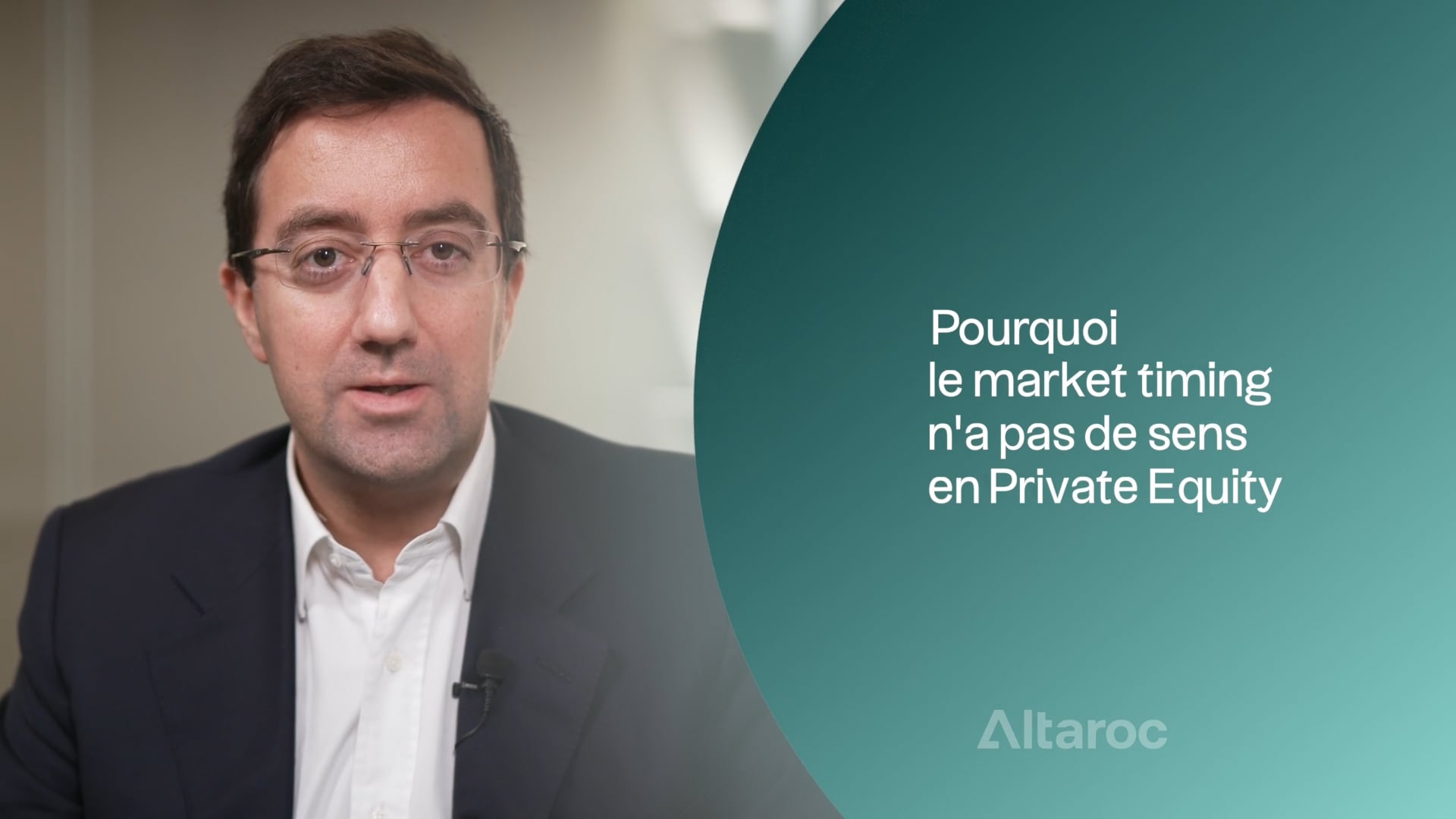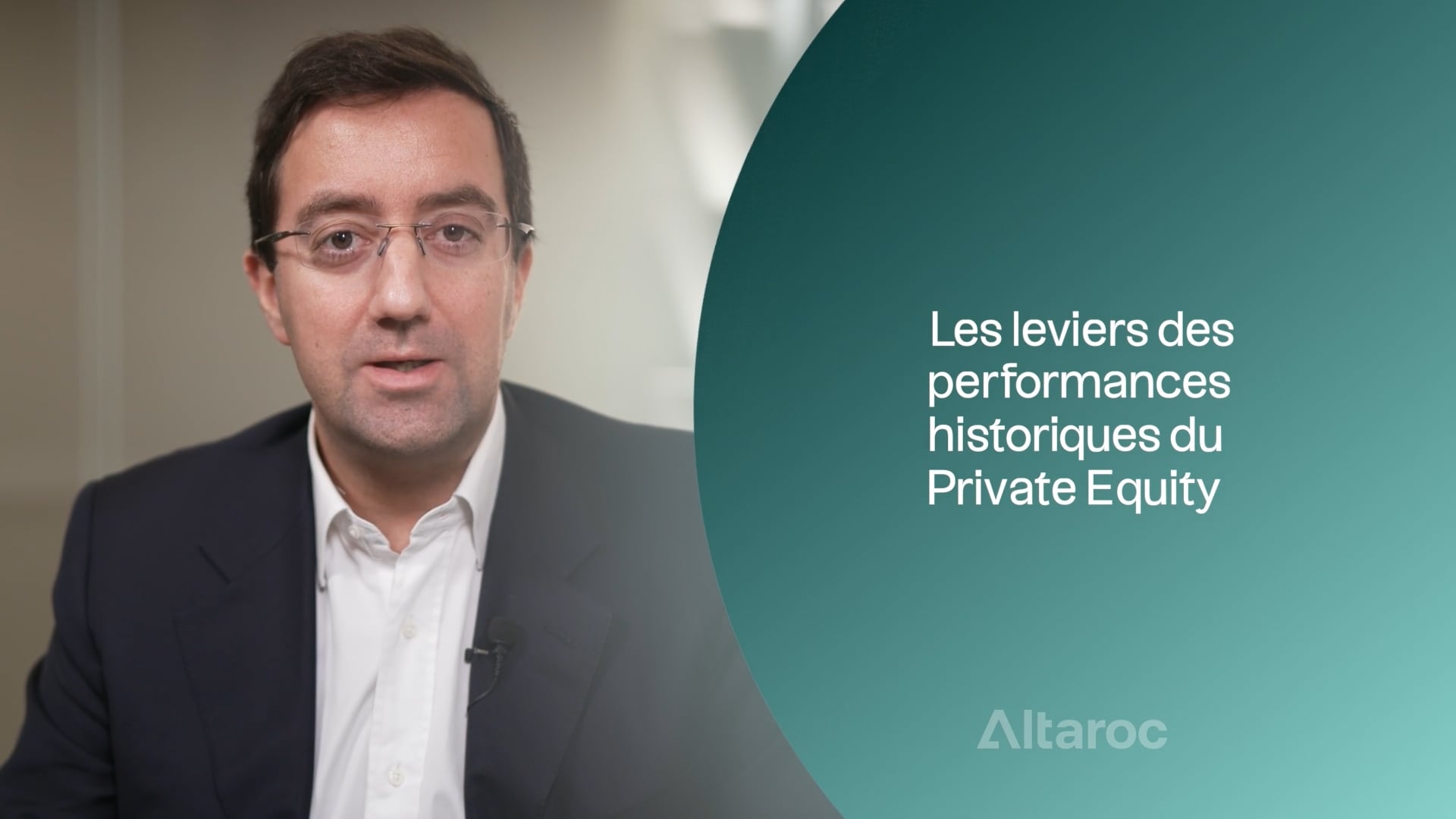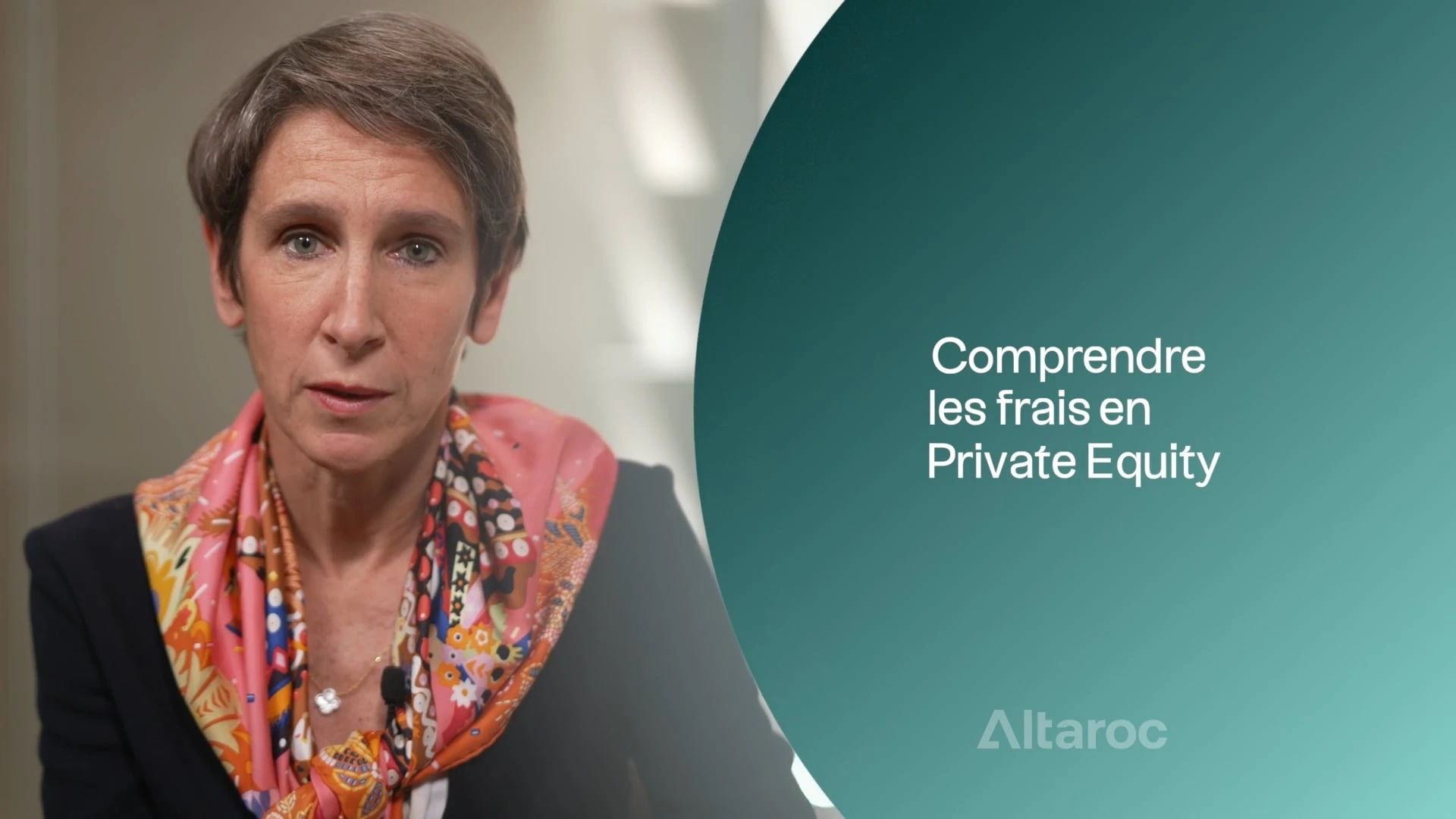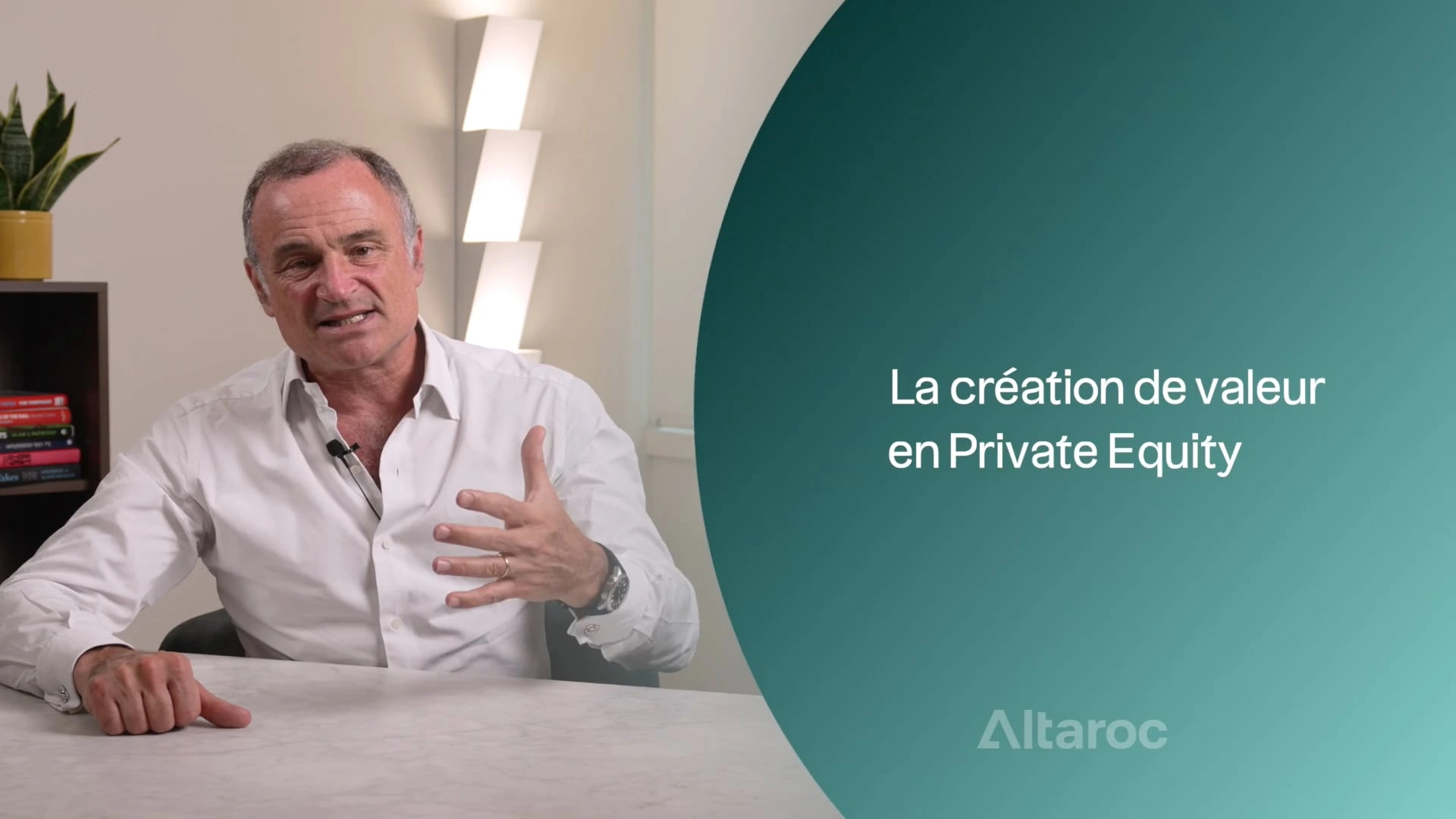Value creation in Private Equity
Summary
Written transcription
Frédéric Stolar: First of all, I'd like to come back to a misconception about Private Equity. People tell me Frédéric Private Equity creates value by cutting jobs and de facto lowering costs. This is totally false. Private Equity creates far more jobs than French industry in general. On average, French Private Equity creates 6.9% net new jobs per year, compared with a national average of 1.8% in private companies. So Private Equity creates far more jobs than the economy as a whole. Your capital invested in Private Equity makes sense in the real economy. So I'd like to try and explain to you why Private Equity structurally outperforms listed markets, because there are recipes that Private Equity employs that listed markets don't have at their disposal. The first is growth. Private Equity, the Private Equity industry, will try to favour companies positioned in high-growth markets, and companies that are constantly gaining market share. And so, by construction, a Private Equity asset will grow much faster than GDP, and an average equity portfolio will grow with GDP. There is therefore a lever linked to structural growth, which is a factor in Private Equity performance. The second lever for Private Equity performance is governance. It sits on the board of directors of the companies in which it invests. If the fund is an LBO fund, it has a majority on the supervisory board and the board of directors.
Frédéric Stolar: As opposed to a listed fund, a manager of a listed company is not even on the board of directors of the companies in which he has invested. So, a Private Equity fund has a much shorter hand, with much shorter reins. The Private Equity fund knows perfectly well all the performance indicators of the companies in which it has invested. The manager of a listed company doesn't even have access to them. The third reason why Private Equity structurally outperforms listed markets is the virtuous alignment of interests. The team in a Private Equity fund must invest in its fund. The management of a company supported by a Private Equity fund must invest in the target in which it is managed. This investment creates a virtuous alignment of interests, whereas the manager of a portfolio of listed companies, for compliance reasons, cannot invest in the companies in the portfolio. This alignment of interests is highly virtuous. I can tell you, having worked with managers who have become owners alongside us, the way they think about their business changes the day they become co-owners with the Private Equity fund. The fourth reason why Private Equity outperforms is that it takes time. The Private Equity industry. It has time on its side. It is measured over 5 to 7 years on its ability to help managers deliver a business plan over the long term.
Frédéric Stolar: Whereas the manager of listed companies is measured over the quarter, did he outperform or underperform the indexes over the quarter? These are two completely different ways of looking at the world. Private Equity managers think seven years ahead. Managers of listed companies think in terms of quarters. Private Equity's fifth performance lever is financial and operational support. The right Private Equity fund will bring real operational, managerial and strategic skills to the management team that supports it. The fund manager of a listed company does not provide this expertise. They're not even on the board of directors. The sixth lever is external growth. The Private Equity fund has a single idea in mind: can I help my management team consolidate the industry in which I've invested, and then buy small adjacent targets on attractive terms, so as to create a European leader, or even a world leader. Ideally, to buy these targets at entry multiples that will be lower than the price at which the fund bought the main target. This is known as accretion. The fund manager of a listed company doesn't take this approach. He's not going to help the listed company in which he's invested to create value through external growth. That's not his business. The seventh lever is the use of bank debt.
Frédéric Stolar: To boost performance, a Private Equity fund will use its capital and balance sheet structure most effectively, adding a little leverage if the company generates recurring cash flow, whereas the manager of a listed fund will be afraid of leverage, and will generally not invest in companies with more than three times EBITDA leverage, whereas a Private Equity fund will not invest in companies without at least three and a half times EBITDA leverage. And then, the last lever of value creation, the eighth, which is fundamental: when a Private Equity fund invests in a target, from day one, it thinks "Who am I going to sell this company to? To which industrialists will I sell this company in 5 to 7 years' time? At a strategic premium at the price I paid for it, having brought to this target a whole series of industrial and operational levers?". Conversely, the manager of a listed fund company, when the company in which he has invested is the target of a hostile takeover bid, runs for the hills. So there you have it, I wanted to sum up some of the levers that enable value to be created in a timeless way in Private Equity. Now, I don't want to say that Private Equity is better than listed markets, because that's not true. Listed markets have real advantages. They offer investors liquidity at all times, which Private Equity does not.
Frédéric Stolar: On the other hand, Private Equity offers levers for value creation that the listed markets do not. So, one very important point - the world of Private Equity has become ultra-competitive. It is no longer possible to create value in Private Equity through pure financial engineering. To create value in a Private Equity fund, you have to develop industrial recipes called "playbooks", to help the companies in which you invest to create value. We often use the term "playbook" at Altaroc, but there are several types of playbook. There are recipes for identifying the best sectors in which to invest. There are recipes for sourcing proprietary transactions. And finally, there are recipes for transforming assets at operational level and helping managers. These industrial recipes take time to develop and perfect. That's why, at Altaroc, we want to invest with managers who have at least 25 years of history, because we believe that in 25 years of history, they have developed, improved and optimized these recipes for creating industrial value, which are the only ones that, once again, really enable us to create industrial value over the long term. So people often ask me, Frédéric, how do Private Equity funds manage to generate net returns of over 20% for investors? What levers do they use? There are five levers.
Frédéric Stolar: Lever one is organic growth. Private Equity funds invest in companies positioned in well-focused markets, ideally companies that are market leaders and are gaining market share against the competition. So the underlying market is growing, and I'm taking market share from the competition. This underpins a business plan based on well-oriented secular growth. That's lever one. Lever two is the improvement in operating margin. The company will achieve an EBITDA or operating profit of 10%. The question for the Private Equity fund is: how can I help the management team raise EBITDA margins from 10% to 20% over the seven-year horizon of the plan? And the idea is to activate various value-creation levers to improve my EBITDA margin rate. Lever 3 is financial leverage. Just like when you buy an apartment, you're going to improve your return on investment by using debt. It's the use of debt at a lower cost than the project's rate of return. So it's the use of financial leverage to boost the project's structural profitability. Lever number four is what we call rewriting or improving the multiple. I explain the ambition of a Private Equity fund
Frédéric Stolar: Ideally, you buy an asset very well. So in an ideal world, it's to buy it over the counter, proprietarily, directly from the seller, without an auction. It's the ideal way to buy. It allows us to diligently evaluate the target, and to buy it perhaps a little below its strategic value. And in an ideal world, the ambition is that this target, which we bought for a whole series of specific reasons in a proprietary context, should be resold to an industrial group five or seven years later, at a strategic premium. I bought it at ten or eleven times EBITDA, and sold it to an industrial group at fifteen times EBITDA. When I got out, the difference was between ten and fifteen times. This is what we call a rewriting, an increase in the EBITDA multiple that prevails over my target. It's a very important lever for value creation. Lever number five, used extensively by LBO funds. This is called consolidation. In other words, buy and build. I'm going to buy a target at the outset, my target is worth 15 EBITDA, a very nice target in an IT services company for example, and I'm going to try to acquire in adjacent geographies or in adjacent technologies and know-how that I don't possess from smaller competitors at eight or nine times EBITDA.
Frédéric Stolar: So I've paid fifteen times, I'm buying competitors at eight or nine times, and what's more, I'm going to bring these competitors industrial synergies. Because I'm a big player, because I have purchasing economies, because I have economies of scale and so my cost price of these acquisitions net of synergies is more like 6 to 7 times. I paid fifteen times for my initial target. I made acquisitions net of synergies at six or seven times, I lowered, I averaged down my entry price. That's what allows Private Equity funds, which have effectively come in at 15 times, to come in at ten times. This obviously creates significant value. This is lever number 5 used by LBO funds as part of their Buy and Build strategies. The reality is that to create 20% leverage, you need to use one or more of these five value-creation levers. You don't need to use them all at once. Let me reiterate a fundamental point: outperformance in Private Equity is not a matter of financial magic. It's about applying operational recipes that are the fruit of decades of support by Private Equity funds, who are constantly improving their recipes and their playbook to create industrial value in the real economy of the companies they work with.

.jpeg)
.jpeg)




--Comprendre-l%25E2%2580%2599appe%25CC%2581tence-des-investisseurs-1.webp)
%2520-%2520les%2520avantages%2520a%25CC%2580%2520investir%25202.webp)
%2520-%2520les%2520avantages%2520a%25CC%2580%2520investir%25201.webp)
%2520-%2520%25C2%25AB%2520c%25E2%2580%2599est%2520toujours%2520le%2520bon%2520moment%2520pour%2520investir%2520en%2520Private%2520Equity%2520%25C2%25BB%25202.webp)




